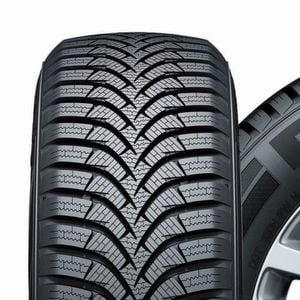Last Updated on 28.08.2024 by hrushetskyy

Have you noticed your tires seem to be making more noise than usual? While some tire noise when driving is normal, other types of sounds can be a cause for concern. Read on to learn about some of the many reasons behind loud tires and what you can do to silence them.
tire making noise when turning
Types of tire noise – what causes tire noise?
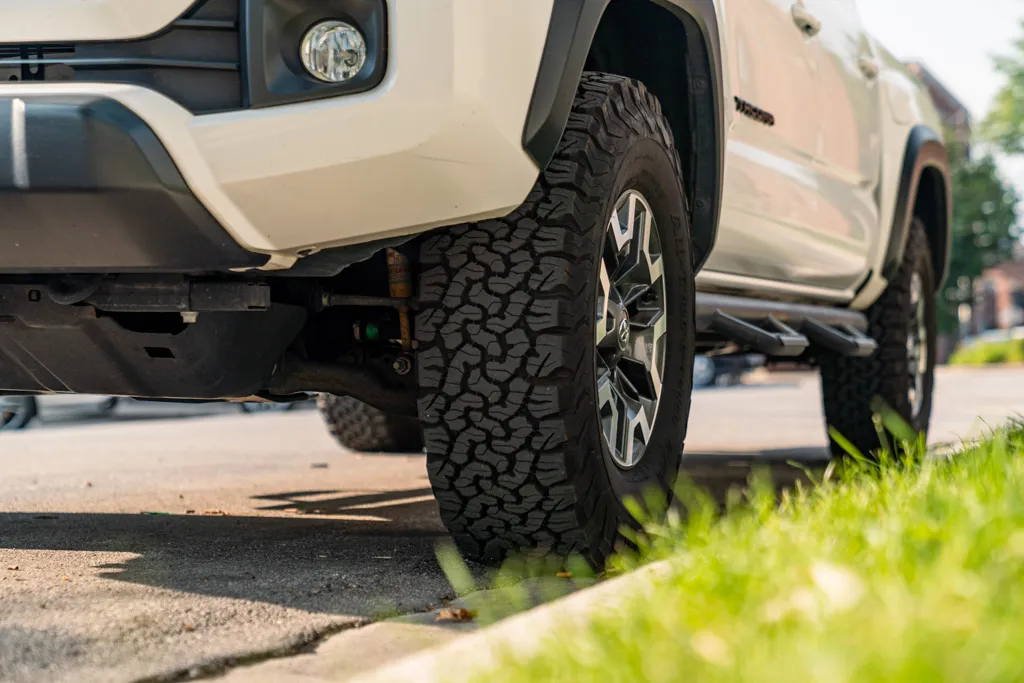
If your car tires sound loud, you don’t necessarily have to worry, as these sounds can be completely normal. But it’s also important to understand when loud tires are abnormal.
Normal causes include:
- Tire type, size, and tread peculiarities
- Road conditions
- Driving conditions and habits.
Abnormal causes include:
- Uneven tread wear
- Improper tire and wheel maintenance
- Damage to non-tire parts.
Normal reasons for a tire making noise when driving
Tire type
All tire types make some noise. Winter tires (especially studded) and off-road car tires sound loud due to their tread pattern and design. Run-flat tires will also be noisier, as they have stiffer sidewalls. Performance tires are quieter but not silent due to their purpose—providing excellent grip and responsiveness.
New, used touring tires and those with low rolling resistance are usually the quietest. So, if these comfort-oriented tires produce a loud noise on a smooth surface, there may be a problem under normal driving conditions.
Tire size
Tires of bigger and smaller sizes than standard usually generate more noise. For example, a 265/ tire has a larger contact patch area than a 235/ tire. Therefore, it will cause more noise, as more rubber will touch the road. In smaller tires, for example, the 40-series, there’s less sidewall to absorb the noise. So, if your car tires sound loud, check their aspect ratio, as the 40-series are noisier than the 60- or 65-series.
NOTE: Use this guide to help understand tire numbers and their meanings.
Tire tread
Tire tread can cause more noise, depending on its design. Directional tread patterns are noisier than asymmetrical ones, and aggressive and symmetrical tire treads also cause more noise. They are usually louder because of how the air moves through the grooves. Some air gets into the channels and gets compressed between the tire and the road surface. As it goes out, it produces a sound, which repeats every time a new portion of air gets into the channel. The more space between the tread blocks (as in off-road tires), the more air gets trapped, which makes your car tires sound loud.
Manufacturers aiming for quieter tires usually put different tread block patterns near one another. Every block pattern produces a different tone when the air comes out of it. The goal is to balance the tones to create a neutral white noise. This process is called pitch sequencing and is vital for maintaining quiet tire noise.
Road conditions
The type of road you’re driving on will also affect the sound your tires make. Coarse and porous surfaces can make your car tires sound louder, so a road with a fresh finish may still have air pockets in it or be sticky, causing a hollow noise. As tires bump on uneven roads, gravel, or brick, they also produce a kind of drumming sound. Highways that are under repair may temporarily have a layer of asphalt or concrete removed. If you drive on such a surface, you will notice a rubbing sound, which will disappear once you switch back to the regular highway again.
The best surfaces to test your tires for tread noise are new asphalt roads and spacerless concrete. These are the quietest and will add almost nothing to the original sound of your tires.
Driving conditions and habits
The way you drive can also make your tires sound louder. This includes:
- Constant high speeds
- Hard braking
- High-speed cornering.
If you use these driving styles, the air in the grooves of your tires often gets more compressed, making it louder. At high speeds, there’s more air circulating through the tread, which multiplies the regular tire noise. The air within the tire also acts like a large resonance chamber, causing a drumming sound.
You might also find that your tires squeal when you accelerate rapidly or maneuver at high speeds. This happens because the tires are trying to find traction.
Abnormal reasons for loud tires
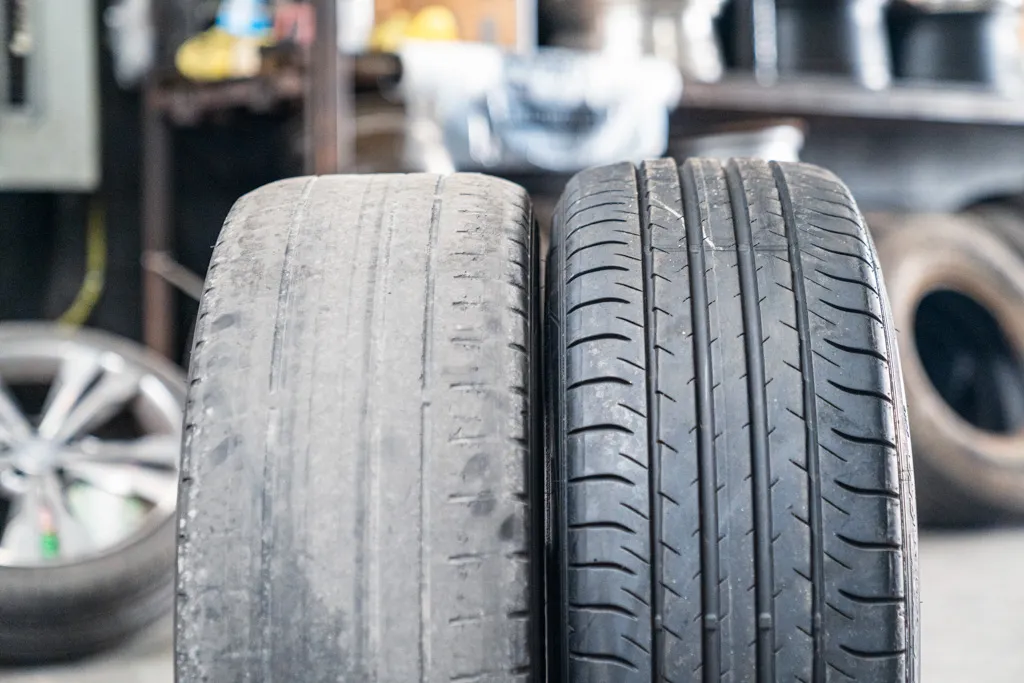
The sounds your tires make can also be a sign of damage or a need for maintenance, so it’s a good idea to pay attention when your tires make a new sound.
Uneven tread wear
Uneven wear on treads may cause excessive noise and vibration, and every pattern indicates a different issue, from improper tire inflation to improperly aligned tires. Some of the most frequent issues and patterns are:
- Under-inflation – wear on the edges of the treadIf you have under-inflated tires, you’ll notice that the inside and outside edges wear more than the central part. The tire flattens too much when driving, adding more pressure to the outer edges. Consequently, the noise the air makes when moving through the tread will be different, making your car tires sound louder. The most usual sound, in this case, is a squeal.
- Over-inflation – wear on the center of the treadIf you notice the center part of the tread is wearing faster than the edges, it’s usually due to over-inflation. In this case, the central blocks take most of the pressure, causing this pattern. To avoid pressure-related tire issues, it’s important to check your tire pressure regularly.
- Wheel misalignment (camber angle) – camber wearWhen one of the shoulders of your tire wears more than the rest of the tire, it’s called camber or one-shoulder wear. This indicates wheel misalignment, particularly in the camber angle. Such misalignment may also be a result of a damaged ball joint or another issue in the wheel or suspension.
- Wheel misalignment (toe-in) – featheringWhen one edge of the rib rounds while the other becomes sharper, the tire is feathering. The main cause of this is a wrong toe-in setting, another wheel alignment parameter. Worn-out bushings or front suspension may also cause this issue.
- Suspension problems – local/patch wearWhen there are areas across the tread where rubber seems to be scooped, this is tire cupping. It may be a result of worn or bent suspension. Tire imbalance may also be the cause, but the wear will be more irregular in that case. Such a wear pattern is called patch wear or local wear.
The most dangerous irregular wear pattern, noise-wise, is local or patch wear, as it causes the tire to vibrate heavily. In the case of uneven wear, only one tire may produce excessive sound. This makes it easier to detect and solve the issue. Once you notice these wear patterns, you should determine and fix the cause, rotating the tires afterward. If the wear to the tread is too deep, you may also need to change the tire.
Improper maintenance
If your car tires sound loud, another issue may be that your tires, wheels, suspension, and other parts require maintenance. A good maintenance routine should include:
- Tire balancing
- Tire rotation
- Wheel alignment.
If you don’t do any of these procedures regularly, your tires are likely to wear unevenly and vibrate, producing loud noises.
Tire balancing
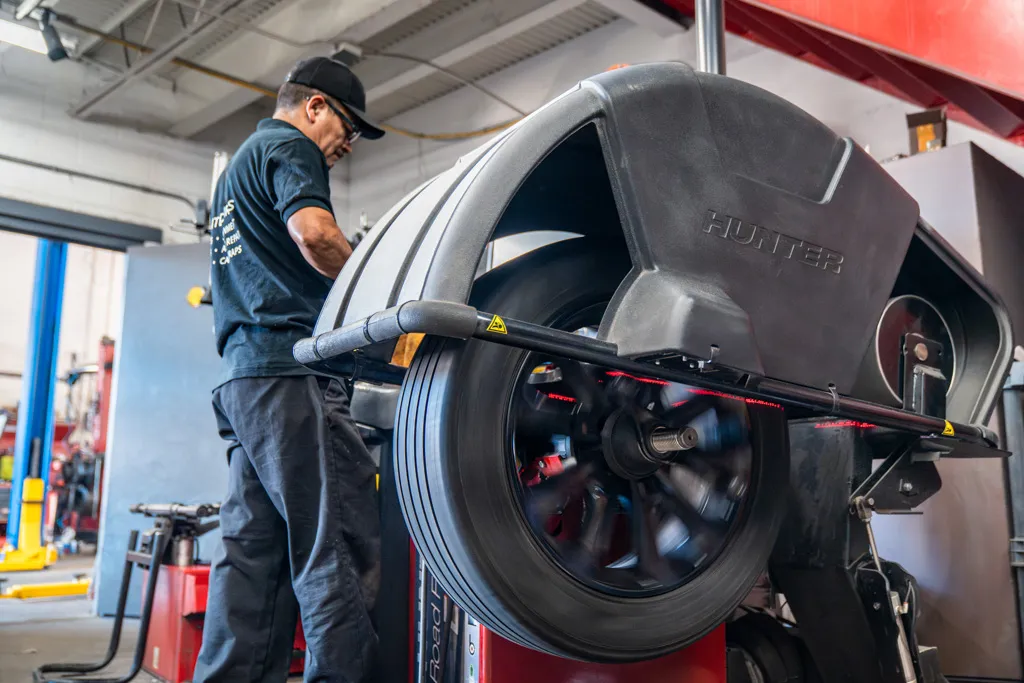
While imbalanced wheels don’t make more noise on their own, they regularly lead to tread wear patterns that can become noisy. This uneven wear will shorten the lifespan of your tires and may even damage your suspension. Tire imbalance is the presence of heavier spots anywhere on the tire. Weight distribution around the tire has to be even, so tires need to be balanced when they are new and again every 3,000-6,000 miles. This is because, as your tires are used the weight distribution changes slightly, eventually requiring rebalancing.
Balancing tires involves putting small weights opposite the heavier spots. You can do it at a mechanic, where a specialist will locate all the places where the rubber is heavier. It will cost you $15-$80, depending on the state of the tires, the mechanic you go to, as well as other factors.
This procedure is vital for ensuring your tires’ long life and safety. You can learn more about detecting tire imbalance and solving the issue in this article.
Tire rotation
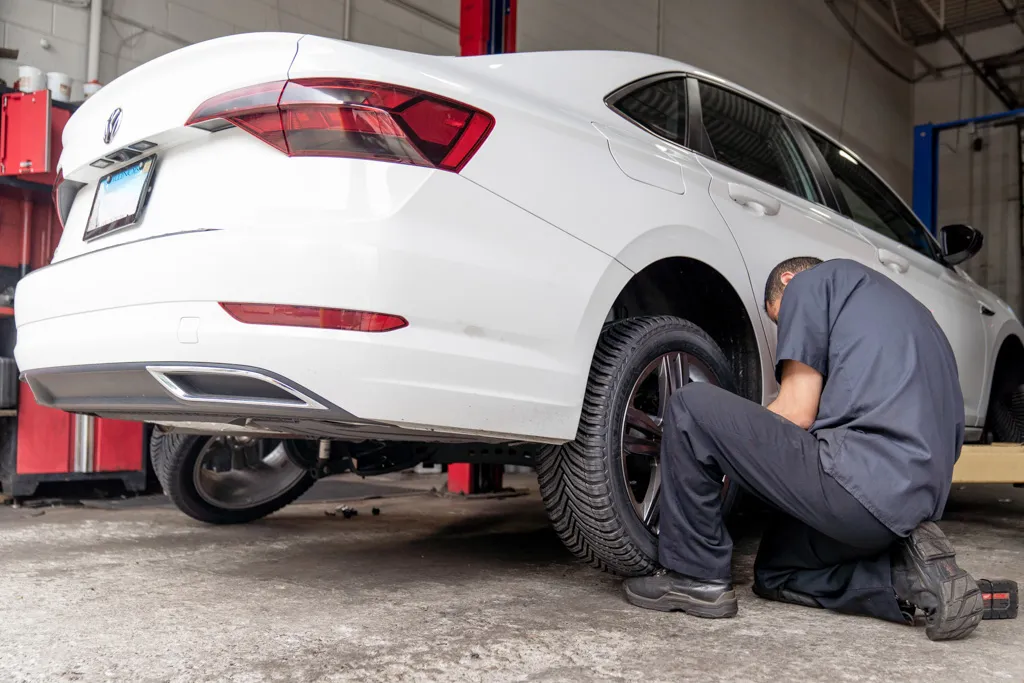
Ensuring your tires are regularly rotated will also help them to wear more evenly, reducing the amount of sound they make.
A lack of tire rotation will make car tires sound loud and last less time due to a different wear rate between them. Tire rotation is moving the tires on their rims to another location on a vehicle. The procedure evens weight distribution between the tires, as it’s usually irregular. Front tires have more weight on them, due to the engine and other parts placed there. In the US, front-left tires also travel more due to the right-hand side traffic, so they wear at a faster rate.
It’s recommended to rotate your tires every 5,000-8,000 miles. You can do it for $25-$120 at a tire shop or dealership. Some shops also do it for free if you buy tires from them.
You can also rotate the tires yourself, but make sure you check the wear of every tire, the alignment, etc. There are several rotation patterns that depend on the severity of wear, tire size, direction, and other factors. Some drivers also include their used spare tire in the chosen pattern. This is a good idea if you have a full-sized functional spare, not a temporary one. This will prolong tire life for about 20,000 miles, as the fifth tire adds mileage.
If you want to learn more about tire rotation, read this article.
Wheel alignment
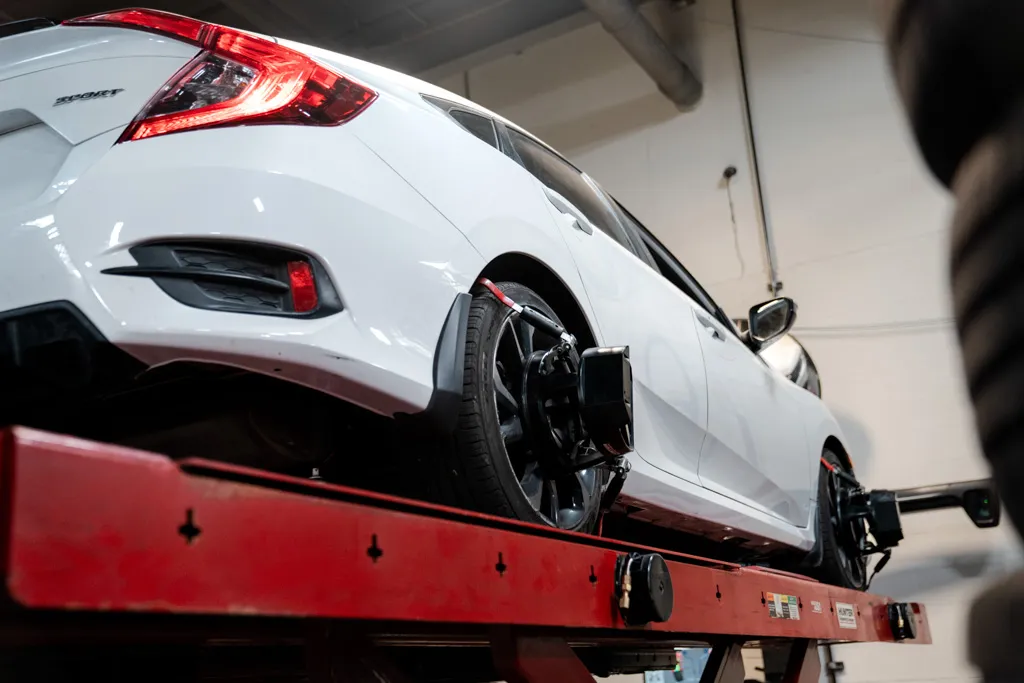
Misaligned wheels can also make car tires sound louder and wear unevenly, as they aren’t parallel to each other or perpendicular to the ground. As a result, car tires sound loud due to the wear patterns and the air chamber’s increasing sound. The car may also tilt to one side, making controlling the car more difficult. Another issue with misaligned wheels is the fact your suspension will also wear prematurely.
Wheel alignment is a set of three angles to which the suspension is fitted:
- Camber is the angle of the wheel perpendicular to the ground.
- Caster is the relation of the steering axis to the ground.
- Toe is the wheels being perfectly parallel to each other.
Most vehicle manufacturers don’t mention this procedure in their guides, so there are no time- or mile-related recommendations for alignment. However, the rule of thumb is to align the wheels annually or as frequently as you rotate your tires. You can get an alignment for $60-$100 at a tire shop or dealership.
Damage to non-tire parts
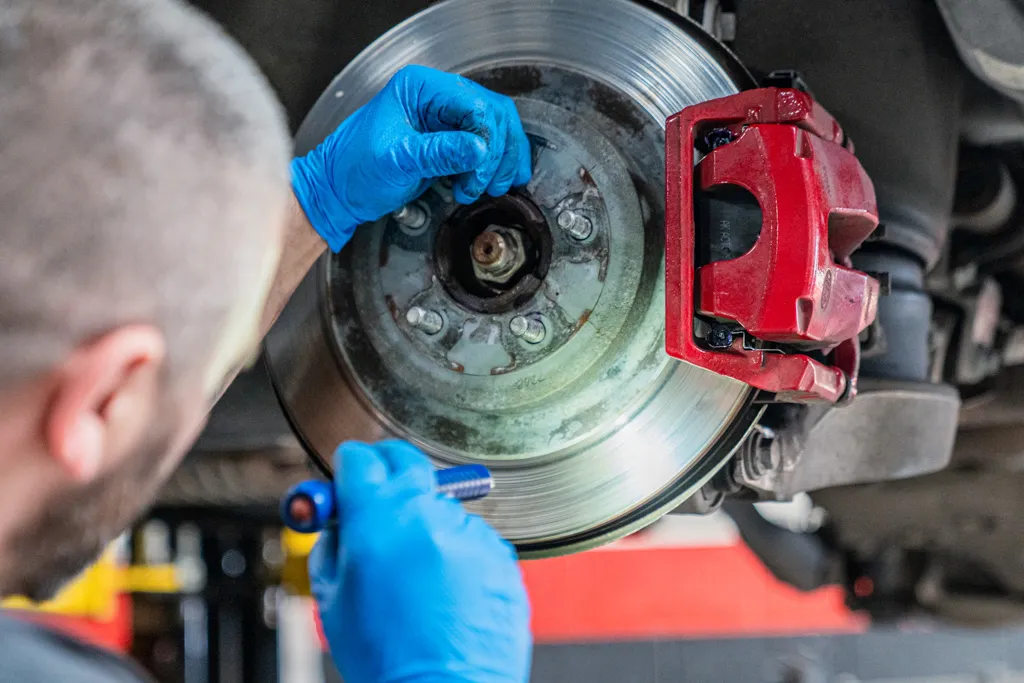
There are several other parts that can contribute to your car tires sounding loud. They may become loose or wear out, causing different sounds, which may be perceived as tire sounds. They might also produce vibrations, eventually making the tires noisier and more dangerous. Some of the car parts to pay attention to are:
- Wheel bearingsWheel bearings may need replacing if you hear a roaring noise when changing lanes. The sound gets louder as your speed increases and the bearings are put under strain. Damaged bearings can be a result of age or a recent accident. As the condition worsens, the possibility of a collision, and losing control of the vehicle, increases.
- BrakesIf you notice a squeaking or squealing sound coming from your wheels, it could be your brakes. This can be because your brake pads or discs are wearing out or there is dirt in the system. Your brakes are a vital part of your car’s safety, so if you notice these sounds, we recommend getting a mechanic to check your car immediately.
- CV jointsIf the CV joints (Constant Velocity) are damaged or worn out, you will hear a clicking or popping noise. This happens because the axle loses the necessary flexibility and can also result in wobbling. In this case, your car tires may also sound loud as they become more vulnerable to shock. CV joints provide axle flexibility as the wheel and suspension move.
- StrutsWhen damage occurs, and struts can’t do their job, your suspension is no longer fully operable. You will feel more shock, which will cause vibration, more pressure on the tires, and, eventually, excessive noise. Struts (not to be confused with shock absorbers) play a major role in absorbing shock from bumps, uneven surfaces, etc.
- Drive beltIf the drive belt becomes loose, it will produce a sound that is easily confused with wheel noise. The drive belt connects the alternator, air conditioning system, and power steering to the crankshaft, which provides these systems with power.
How to stop tire noises: solutions
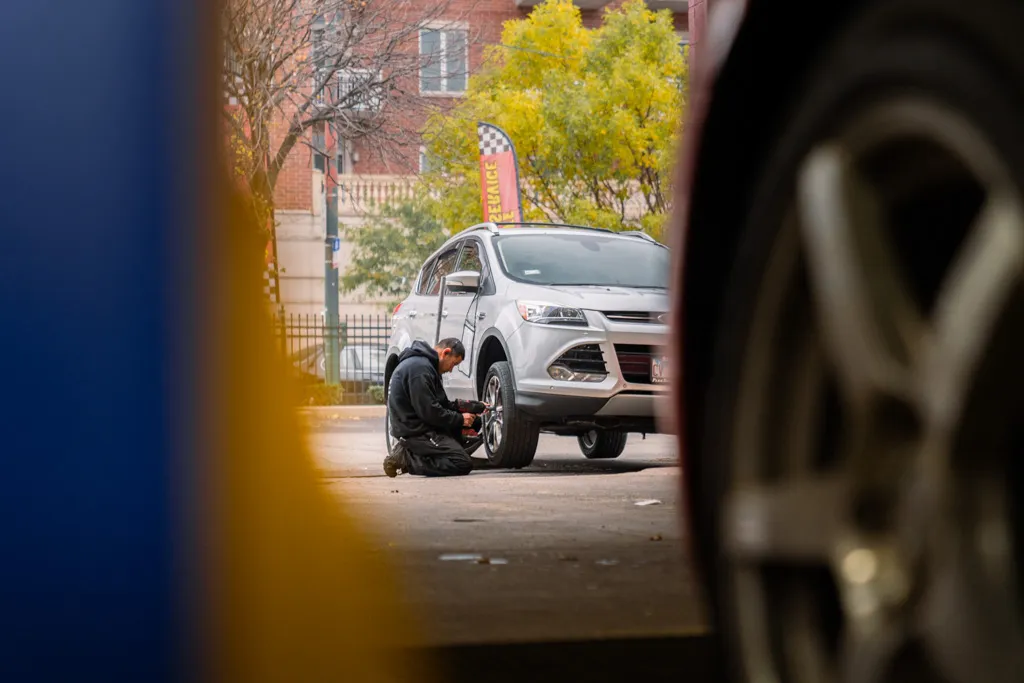
Here are some things you can do to decrease or eliminate the possibility of developing loud tire noise:
- Choose tires wiselyBalance your needs and state your priorities, as there’s much to consider when buying tires. If little noise is one of your top priorities, choose touring tires, as they use tread patterns and materials that absorb most sounds. Read your vehicle’s owner’s manual and read reviews online before making a choice.
- Maintain your tiresOn average, tires roll around 4 million times over 5,000 miles. So balancing and rotating your tires once, or aligning wheels when they are new, isn’t enough. When car tires sound loud, you might have missed essential maintenance procedures. Start maintaining your tires and wheels as soon as possible; don’t wait until your tires are worn out.
- Change tires when neededTires last for 6-10 years, depending on their type and the maintenance you provide. Make sure you change them when they reach the maximum age or when you notice cracks in them. Cracks mean the rubber has deteriorated to the point where the tread may separate at any moment. To learn what age your tires are, look at the last four digits of their DOT code. This is the date code: the first pair is the week, and the second is the year of manufacture.
Frequently Asked Questions
What does it mean when your tires make noise?
When your tires start making noise, it might be normal road sounds or a sign of something wrong with your car. Usually, tire noise can signal a few things. One common culprit is tire wear, especially if the tread is unevenly worn or if the tires are getting old. It could also be a sign that your tires need balancing or alignment. And don’t forget about tire pressure – if it’s too low or too high, this can cause noise, too. Sometimes, it might even be the road surface itself, but if the noise seems unusual or excessive, it’s best to have a mechanic check your car to make sure everything is in good working order.
Is it tire noise or wheel-bearing?
It can be difficult to determine if it’s tire noise or a wheel-bearing issue. Tire noise usually changes with road surface and speed, while wheel bearing noise is often a consistent growl that increases with speed and may change when turning. You can try turning slightly while driving; if the noise changes, it’s likely a wheel bearing. However, if you suspect either, having a mechanic take a closer look is wise.
How to fix noisy tires?
Fixing noisy tires starts with a thorough inspection to check for uneven wear, signs of damage, or if they’re simply getting old. Next, ensure your tires are properly inflated—improper tire pressure can amplify noise and cause uneven wear, which can lead to further noise. If your tires are worn unevenly, a tire rotation, wheel alignment, or balancing might be required to even out the wear.
Share the Knowledge
